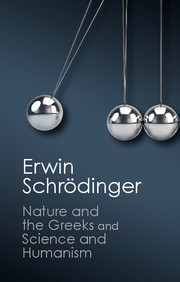Book contents
- Frontmatter
- Contents
- Foreword
- NATURE AND THE GREEKS
- SCIENCE AND HUMANISM
- Dedication
- Preface
- The spiritual bearing of science on life
- The practical achievements of science tending to obliterate its true import
- A radical change in our ideas of matter
- Form, not substance, the fundamental concept
- The nature of our ‘models’
- Continuous description and causality
- The intricacy of the continuum
- The makeshift of wave mechanics
- The alleged break-down of the barrier between subject and object
- Atoms or quanta-the counter-spell of old standing, to escape the intricacy of the continuum
- Would physical indeterminacy give free will a chance?
- The barto prediction, according to Niels Bohr
The spiritual bearing of science on life
Published online by Cambridge University Press: 05 October 2014
- Frontmatter
- Contents
- Foreword
- NATURE AND THE GREEKS
- SCIENCE AND HUMANISM
- Dedication
- Preface
- The spiritual bearing of science on life
- The practical achievements of science tending to obliterate its true import
- A radical change in our ideas of matter
- Form, not substance, the fundamental concept
- The nature of our ‘models’
- Continuous description and causality
- The intricacy of the continuum
- The makeshift of wave mechanics
- The alleged break-down of the barrier between subject and object
- Atoms or quanta-the counter-spell of old standing, to escape the intricacy of the continuum
- Would physical indeterminacy give free will a chance?
- The barto prediction, according to Niels Bohr
Summary
What is the value of scientific research? Everybody knows that in our days more than ever before a man or a woman who wishes to make a genuine contribution to the advancement of science has to specialize: which means to intensify one's endeavour to learn all that is known within a certain narrow domain and then to try and increase this knowledge by one's own work—by studies, experiments, and thinking. Being engaged in such specialized activity one naturally at times stops to think what it is good for. Has the promotion of knowledge within a narrow domain any value in itself? Has the sum total of achievements in all the several branches of one science—say of physics, or chemistry, or botany, or zoology—any value in itself—or perhaps the sum total of the achievements of all the sciences together—and what value has it?
A great many people, particularly those not deeply interested in science, are inclined to answer this question by pointing to the practical consequences of scientific achievements in transforming technology, industry, engineering, etc., in fact in changing our whole way of life beyond recognition in the course of less than two centuries, with further and even more rapid changes to be expected in the time to come.
- Type
- Chapter
- Information
- 'Nature and the Greeks' and 'Science and Humanism' , pp. 105 - 113Publisher: Cambridge University PressPrint publication year: 2014

